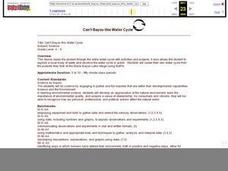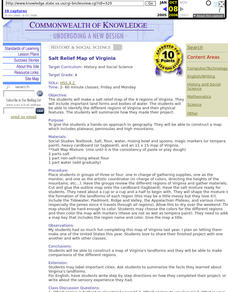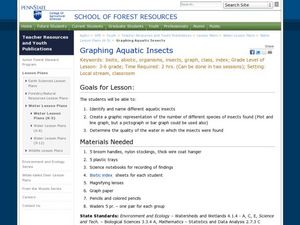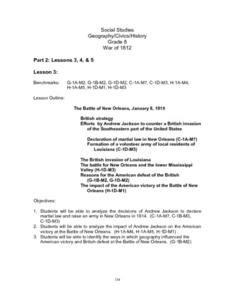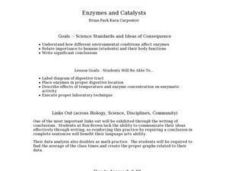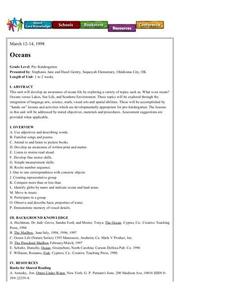Curated OER
Can't Bayou this Water Cycle
Students identify the stages in the water cycle. They observe a local water source and view the cycle in action. They create their own water cycle using software.
Curated OER
Salt Relief Map of Virginia
Fourth graders create a salt relief map of the four regions of Virginia. They indentify land forms and bodies of water, and summarize how they made their project.
Curated OER
Graphing Aquatic Insects
Students identify aquatic insects. For this organism lesson, students locate aquatic insects near a local waterway and collect them. Students graph the amount of insects that they collected.
Curated OER
Water Quality
Students examine the YSI and the water properties that it measures. They identify the different properties of water pH, DO, temperature, turbidity, and salinity and determine why it is important for them to test these parameters.
Curated OER
Human Impact on Water Quality
Students identify at least three common repercussions of developing water front property on water quality. They describe three sources of water pollution. They research the organism striped bass and observe it if striped bass is available.
Curated OER
Determining the Proper Cement: Water Ratio for Quality Concrete
High schoolers examine concrete samples and guess their strength. They determine the correlation between concrete strength and the cement to water ratio that was used in making each sample. They make a quality concrete based on their...
Herff Jones Education
Acids, Bases, and Indicators—Colorful Chemistry
Lead the class in a colorful exploration of acids and bases as they learn to differentiate between the two. They identify common items considered acidic and basic, then explore their strengths and weaknesses. They titer solutions and...
Maryland Department of Natural Resources
Eyes on Dissolved Oxygen
Learn about the factors that affect the way oxygen dissolves in salt water with a chemistry lab. After studying the molecular structure of water, young scientists figure out how aeration, temperature, and organic waste affect...
Curated OER
Decolonization in Asia
Pin point areas in Asia that went through decolonization and regained independence from colonial rule. There are 32 countries and bodies of water to identify on the provided map.
Curated OER
Fish Around the World
Students use a globe to answer questions such as which continent they live in and the country in which they live. They identify at least two bodies of water near their state and two foreign countries. In groups, they complete a...
Curated OER
Mapping Landforms of South Carolina
Third graders analyze South Carolina maps. In this geography lesson, 3rd graders locate the five land regions in the state are and discuss how the regions are different. Students identify the major bodies of water and analyze how...
Curated OER
War of 1812
Eighth graders locate the major land forms and bodies of water on a map of Louisiana. In groups, they discuss the role of the Mississippi River in the Battle of New Orleans and how land and water affect the outcome of battles. To end...
Curated OER
Map Skills
Students create two types of maps. In this map skills instructional activity, students discuss map vocabulary and view maps of Florida. Students draw a free hand map of Florida and include major cities, bodies of water and...
Curated OER
A Limnology Study of Drainage Ditches
Students chemically test water, observe microscopic organisms in the classroom, and screen the sample for macroinvertebrates. They design a reporting sheet that list all the items to be tested and a space to record the results.
Curated OER
Watershed Investigations
Students explore the components of a watershed and the factors that affect it. They read a topographical map and use geometry to determine the area of a watershed. Students estimate the volume of a body of water and perform runoff...
Curated OER
Enzymes and Catalysts
Students discuss the functioning of the digestive system and the specific enzymes present. They observe the action of amylase on starch to identify characteristics of enzymes then perform an experiment on the effects of temperature on...
Curated OER
Drinkable Snow
Students explore snow. In this forms of water lesson, students read a story about snow, identify the types of snow found in Alaska, and learn Inuit words for snow. The lesson calls for an Intuit Elder to visit the classroom as a guest...
Curated OER
Introduction to Digestion: What Happens to a Hamburger?
Students explore the human body by analyzing how food is absorbed. In this food digestion lesson plan, students utilize health vocabulary terms by participating in a guessing game activity. Students discuss their own eating habits and...
Curated OER
Tongue Map
Students explore human anatomy by conducting a human senses experiment. In this taste lesson, students identify the main purpose of a tongue and how it enhances our eating habits. Students utilize baking coca, lemon juice, salt and honey...
Curated OER
Skeletal, Skin, and Muscular Systems
Eighth graders explain the functions of various body systems. Using a concept map, 8th graders identify and explain the fuctions of the skeletal, skin, and muscular systems of the body. After completing their concept map, students...
Curated OER
Mini-Ponds
In this mini pond worksheet, students create a mini-pond ecosystem with soil, water, and plant life. Students let their ecosystem sit for a day and they observe a sample the next day. Students identify all the pond water microorganisms...
Curated OER
Phytoplankton and Ocean Color
Fifth graders identify function of phytoplankton in the biospere by conducting experiments and simulations and reading for information. They detect the presence of phytoplankton in bodies of water by examining ocean in satellite images...
Curated OER
Oceans
Students become aware of the differences between ocean water and lake water by smelling, tasting and seeing. They distinguish between land and bodies of water on a globe and gain increased awareness of oceans and life.
Curated OER
A Coin Out of Water
Pupils examine the Michigan state quarter and identify land and water on the quarter. They locate the Great Lakes and other bodies of water on a map. They compare and contrast streams, rivers, ponds, lakes, and oceans.


